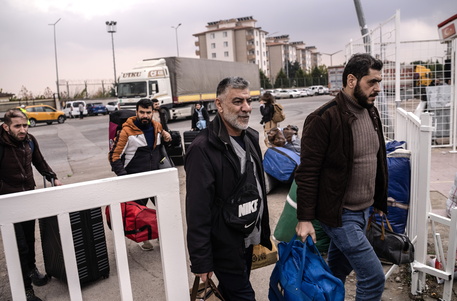(ANSA) - ROME, DEC 13 - In the former EU member state, the UK
Home Office (currently with almost 5,700 applicants) has taken a
similar line as Germany or France, suspending asylum
applications from Syrian citizens until it "evaluates" the
current situation, the British Home Office said in a statement.
Portugal has not yet decided whether to suspend hosting future
migrants, said the Portuguese prime minister Luís Montenegro.
The country will not return the 1,243 refugees it is currently
hosting to Syria after the fall of Bashar al-Assad's regime,
Montenegro added. "We won't send any of them back, we'll take
care of their integration and reception," Montenegro continued.
According to the Czech Prime Minister Petr Fiala the situation
in Syria carries security risks for Europe, but it can also be
an opportunity for creating a better life in the country and the
return of some Syrian refugees. "In order to create better
conditions for life in Syria in the future than they have been
so far under the Assad government," he said. There are currently
328 people of Syrian nationality who have been granted
international protection in the form of asylum or subsidiary
protection in the Czech Republic, Fiala said.
The Spanish government is not considering suspending asylum
procedures for Syrian citizens for the time being, the Minister
of Foreign Affairs, European Union and Cooperation José Manuel
Albares said on Tuesday.
Slovenia shares a similar approach. On Wednesday, the Interior
Ministry announced that the processing of applications for
international protection from Syrian nationals in Slovenia will
not be suspended for the time being. Its data shows Syrians
remain the largest group of illegal migrants; more than 14,000
of them crossed into the country in the first ten months of the
year. In the year to December Syrians submitted 184 applications
for international protection in Slovenia.
Bulgaria has not made a decision yet to suspend the granting of
asylum to people from Syria as the situation in the country is
still too insecure, caretaker Foreign Minister Ivan Kondov said
on Wednesday. "At this time, it is of the utmost importance to
launch an inclusive, Syrian-led political dialogue in
implementation of UN Security Council Resolution 2254 to ensure
an orderly peaceful and inclusive transition," he stressed.
Amnesty International and the UN warn against underestimating
the risk.
The NGO Amnesty International urged European governments on
Tuesday to "immediately reverse" their decisions to suspend
asylum applications for Syrians and urged them not to sacrifice
the safety of these citizens for the sake of "anti-refugee
policies" that prevail on the continent, considering that the
situation in Syria is extremely volatile.
The United Nations High Commissioner for Refugees Filippo Grandi
has stressed that the new situation in Syria could allow "the
world's largest crisis of forced displacement to move towards
fair solutions", although he pointed out that the situation is
still uncertain.
EU: "not currently engaging" with Syrian Islamists HTS.
The European Union issued a statement on Monday saying that it
was not in contact with Islamist group HTS, which spearheaded
the ouster of Assad, and urged a peaceful political transition.
HTS is rooted in a Syrian branch of Al-Qaeda but broke ties with
the jihadist group in 2016. HTS and its leader, Abu Mohammad
al-Jolani, are under EU sanctions.
"The European Union is not currently engaging with HTS or its
leader, full stop," EU spokesman Anouar El Anouni said. "As HTS
takes on greater responsibilities, we will need to assess not
just their words but also their actions."
The 27-nation bloc also released a statement saying: "Now more
than ever, it is imperative that all stakeholders engage in an
inclusive, Syrian-led and Syrian-owned dialogue on all key
issues to ensure an orderly, peaceful and inclusive transition."
The EU said it was "critical to preserve the territorial
integrity of Syria and to respect its independence, its
sovereignty, as well as state institutions, and to reject all
forms of extremism".
European Commission President Ursula von der Leyen held talks
with Jordan's King Abdullah II about the situation on Monday and
said she would talk to other regional leaders in the coming
days. Next week, von der Leyen will meet the President of
Türkiye, Recep Tayyip Erdoğan.
The EU's top diplomat, Kaja Kallas, on Sunday welcomed the fall
of Bashar al-Assad and said it pointed to the weakness of some
of his supporters, including Russia. "The end of Assad's
dictatorship is a positive and long-awaited development. It also
shows the weakness of Assad's backers, Russia and Iran," Kallas
said in a social media post. "The process of rebuilding Syria
will be long and complicated and all parties must be ready to
engage constructively," she added.
(The content is based on news by agencies participating in the
enr, in this case AFP, ANP, ANSA, Belga, BTA, CTK, dpa, EFE,
Europa Press, Lusa, STA, Tanjug). (ANSA).
EU countries put Syrian asylum applications on hold (2)
Assad regime collapses
